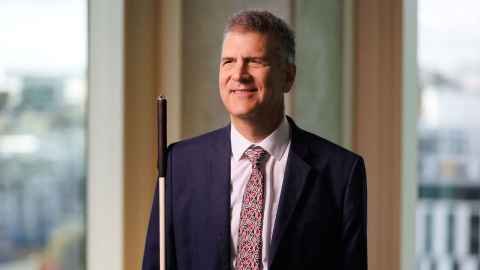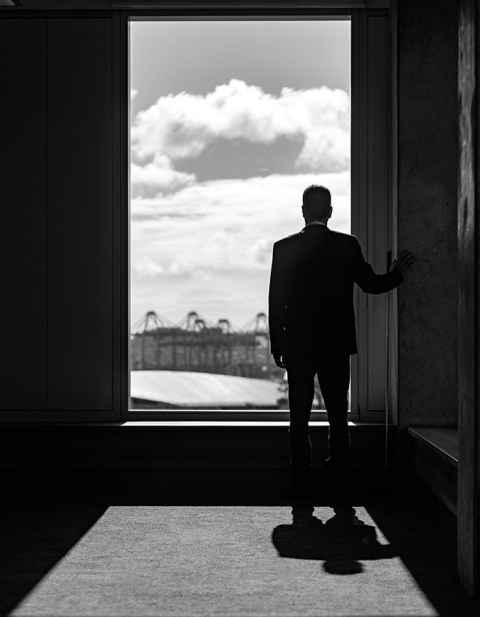Robert Greenberg: ability to inspire
29 April 2024
After 11 years heading the Faculty of Arts, departing dean, Professor Robert Greenberg, is moving on to a new role in Australia. He reflects on his time at the University.

If anyone recognises Professor Robert Greenberg, it’s the students at the Arts graduation, he says.
“I’m the blind dean who reads their names in Tongan, Samoan, Māori, Chinese, Russian, Spanish, Arabic and English. I also stand up at meetings and events to do a mihi or waiata.”
He’s also the dean who holds regular, informal ‘pop-in hours’ – a chance to hear suggestions or complaints from staff. And he likes to visit them in hospital when they’re sick.
Greenberg, who has held positions at Yale and Georgetown among others, was dean and professor at Hunter College of the City University of New York, before arriving "fresh off the boat" from the US in 2013. Choosing from among many rich things the job has offered him since then, he says connecting with his own values rates highly.
“Being Jewish, we’re brought up with charity [tzdaka], respect for learning, and a desire to make the world a better place [tikkun olam].”
The biggest challenge in his first year, however, was implementing the change from 16 departments and centres into four schools.
“I was brought in at the end of that process. It wasn’t a popular development at a challenging time, as we had fewer professional staff supporting our academic staff – although people at least were understanding that I was inheriting this decision.”
Under his leadership, the faculty has significantly increased, retained and promoted its Māori and Pacific staff, and branched into areas in those disciplines like the environment and mental health, as well as increasing capacity in te reo Māori; with the number of academics in Te Wānanga o Waipapa (School of Māori Studies and Pacific Studies) more than doubling in the last eight years.
As a linguist with expertise in South Slavic languages, Greenberg is also notable for embracing te reo himself, and speaking it confidently at official events.
“After taking some first-year classes, I did some private lessons here. I think it sends a good message as a leader to model the values of a place, of what we believe in, and also to acknowledge tangata whenua, so everybody feels the specialness of where we are.”
On his watch, the faculty introduced popular programmes responding to changes in students’ interests: undergraduate degrees in communications and global studies, and masters programmes in Indigenous studies and conflict and terrorism studies; as well as the Art Scholars programme, where students from across the faculty grapple with social, economic and cultural questions through discussions and debates.
“It was very satisfying to watch some of these things take off,” he says.
“We’ve achieved a lot as an Arts leadership team, as well as supporting people who have taken on significant University or national leadership roles themselves; like [Pro Vice-Chancellor Pacific] Jemaima Tiatia-Siau and Professor Tracey McIntosh, and of course we have major research centres like Ngā Pae O Te Māramatanga, the James Henare Research Centre, the Public Policy Institute, Koi Tū, and COMPASS.”

And with these new and existing centres has come a welcome increase in external funding from around $500,000 in 2013 to about $10 million annually.
A relatively new approach for the University at the time was philanthropy, something he also established in his first year on the job.
“One of the things I wasn't shy about was making and building relationships with donors, alumni, friends and supporters.”
These relationships led to a significant increase in philanthropic funding for the faculty, which over 11 years, has amounted to $20 million.
“I’m really proud that this has enabled us to fill several academic positions in the humanities, in particular in art history, philosophy, and theological and religious studies, as well as lots of scholarship money for students we didn't used to have.”
Gender equity had also been a strong focus. “We’ve had more women promoted to professor, and we’ve worked hard to identify women who might have held back or been held back.”
While he clearly enjoys supporting his staff, he in turn has felt very much supported in his role.
“I remember sitting in senior leadership meetings, and the former Vice Chancellor, the late Professor Stuart McCutcheon, just whispering in my ear some explanation of an acronym like, ‘That's not your MIT, that's Manukau Institute of Technology’; then there were EFTS [equivalent full time study], the PBRF [performance-based research funding] … we don’t have those in the US.”
Another big challenge came in 2016 when the equivalent full time student numbers took a dive.
“We really needed to think about what we were doing in the faculty from a curricular perspective, so we started the ‘BA renewal’, which was to make the Bachelor of Arts more attractive to our students and simplify the structure.”
The project helped improve the faculty’s financial position and increased the relevance of its teaching and learning programmes.
I think it sends a good message as a leader to model the values of a place, of what we believe in, and also to acknowledge tangata whenua, so everybody feels the specialness of where we are.
One of the reasons he went into academia, he says, was to work with students. “I love the ability to inspire young people to contribute to solutions to global challenges like climate change; if I’ve done that, I’ll be very happy.”
And thanks to his vision, and that of other University leaders, students and staff in the faculty now have a beautiful new space in which to study and work – building B201 on Symonds Street.
“I took colleagues on a tour of the old building that I was determined should be top priority about five years ago, pointing out where the asbestos was, where the windows were broken, where the ceiling was falling down, and a campaign was launched for a total renovation.”
Unfortunately, however, he’ll only get to enjoy his handsome new office for a few more weeks.
So does he think being here – for much longer than the usual five-year dean’s tenure – has changed him?
“I think it has. I’ll always look back on this University and faculty with very warm feelings. I’m no longer a stranger, it’s now my home, and I’m so proud of the many things we’ve achieved here together.”
Professor Robert Greenberg is taking up the role of Pro Vice-Chancellor of the College of Human and Social Futures, University of Newcastle, Australia.
by Julianne Evans
This story first appeared in a shorter version in May UniNews.
Media contact
Julianne Evans | Media adviser
M: 027 562 5868
E: julianne.evans@auckland.ac.nz